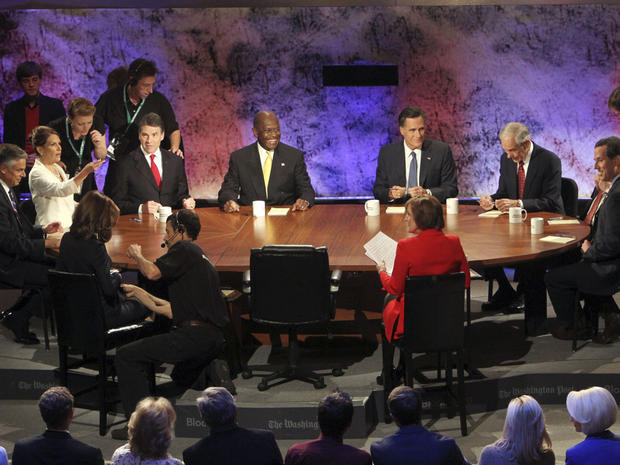GOP candidates step in to end calendar chaos
The only group of people with enough pull to solve the great primary calendar conundrum are the very people it matters to the most, the candidates. After the mad dash among states to move their caucus and primary events even earlier in 2012, the candidates themselves are calling for calm and threatening to boycott one of the states that moved up, the Nevada caucus.
After Florida jumped the calendar and set its primary January 31, South Carolina moved up to January 21 and Nevada moved up to the week prior. But Nevada's chosen date of January 14, 2012, violates the state law of New Hampshire, which would be wedged in between Iowa on January 3 and Nevada. That scenario does not give New Hampshire the week its law requires between contests. This week, the Secretary of State of New Hampshire threatened to hold its primary in 2011 and puts the entire blame on Nevada.
"Right now, the problem is the date of Nevada," wrote Secretary of State William Gardner. "So if Nevada does not adjust its caucus date to a later time, I cannot rule out the possibility of a December primary," he said.
New Hampshire is asking the Republican Party of Nevada to move the caucus back to at earliest January 17th, which would allow New Hampshire to hold its primary on January 10, 2012 and Iowa the week prior. In an attempt to exert pressure on Nevada and to keep all of the primaries in 2012, many of the Republican candidates have pledged to boycott the Nevada caucus if the date does not change.
The effort started with former Utah Governor Jon Huntsman.
"In an effort to preserve New Hampshire's historic first-in-the-nation primary status, the Huntsman campaign will boycott the Nevada caucus as long as the state continues to jeopardize New Hampshire's primary date," said Huntsman's campaign manager, Matt David, in a statement.
Other campaigns have followed suit, including Representative Michele Bachmann, former House Speaker Newt Gingrich and former Senator Rick Santorum, who has cancelled campaign events in Las Vegas and Reno.
"While Senator Santorum appreciates the hospitality of the people of Nevada, he is concerned that Nevada's decision encroaches on Iowa and New Hampshire's election calendar and may push them into the Christmas season. Senator Santorum continues to hold out hope that cooler heads will prevail and Nevada will simply move their caucus back a few days to allow a semblance of sanity to be reinstated into the primary process," said Hogan Gidley, Santorum's communications director.
But other campaigns have stayed away from the boycott.
"This talk of boycotts doesn't serve the electoral process any more than the states' jockeying for position and primacy," said Ron Paul's campaign chairman, Jesse Benton. " New Hampshire deserves its rightful place as the first primary in the nation, but we will fight to preserve that place without depriving Nevada or Iowa voters of their say in the 2012 nomination process," he added.
Former Massachusetts Governor Mitt Romney, who won the Nevada caucus in 2008, is putting a great deal of time and resources into both New Hampshire and Nevada and has pledged to compete in both.
"It is up to each state to determine the date of their primary or caucus. Governor Romney will compete in every nominating contest across the country, regardless of when they may be scheduled, so long as New Hampshire retains its first in the nation primary status," said Romney spokesman Ryan Williams, on Thursday. In fact next week, Romney will travel to Nevada to open up his campaign s state-wide headquarters in Las Vegas.
Texas Governor Rick Perry also will not boycott Nevada. Herman Cain though, is considering joining the boycott.
It's a tricky spot for Nevada s Republican party. If it doesn't move, it would get a lot of attention as the first event in 2012, as it would be expected that Iowa would move up ahead with New Hampshire into 2011. The Iowa caucus is traditionally the first campaign event on the cycle and New Hampshire, which follows it, is the first in the nation primary. But Nevada could suffer if the other candidates don't campaign there.
At the same time, New Hampshire has gotten itself into a bit of a scheduling pickle, by threatening to move its primary to 2011. If Nevada doesn't move back, it would appear that New Hampshire would move up, to at least honor its public threat, but as National Journal and other organizations have reported, finding a date for the Granite state primary could be tricky. National Journal reported that a federal law mandating that there must be at least 45 days from when absentee ballots are mailed out and the date of an election puts additional pressure on New Hampshire because the filing deadline for the primary ends October 28th meaning that the hope for an early December primary is doubtful based on when ballots could be printed and mailed.
Secretary of State Gardner said that both December 6 and December 13 are realistic options but those dates are called into question when figuring in the absentee ballot law.
So there is no easy solution. But as the states battle each other, the candidates themselves may have the greatest pull, and may be the last hope, in trying to settle the calendar and in keeping all of the 2012 Republican nominating events in calendar year 2012.

